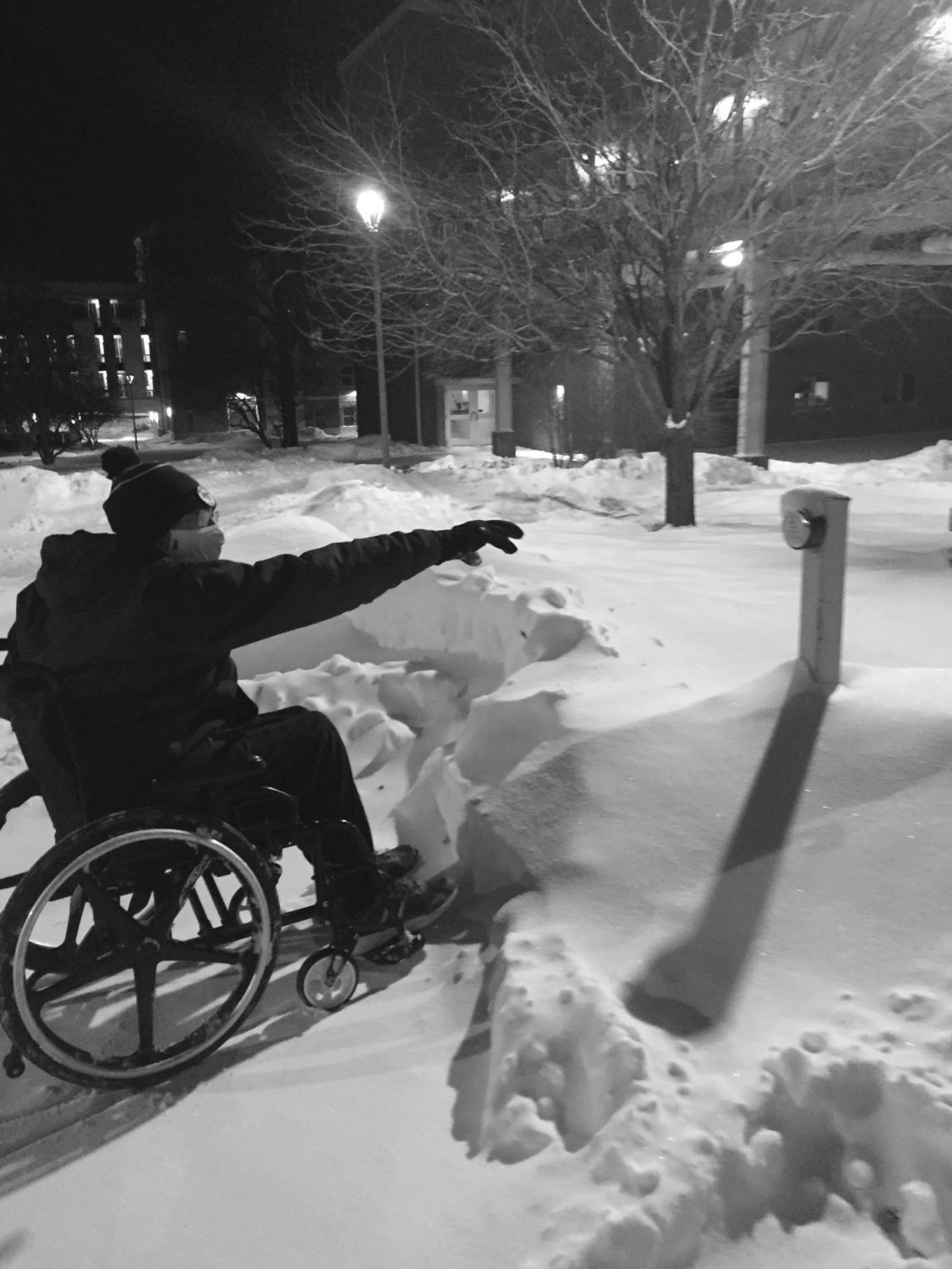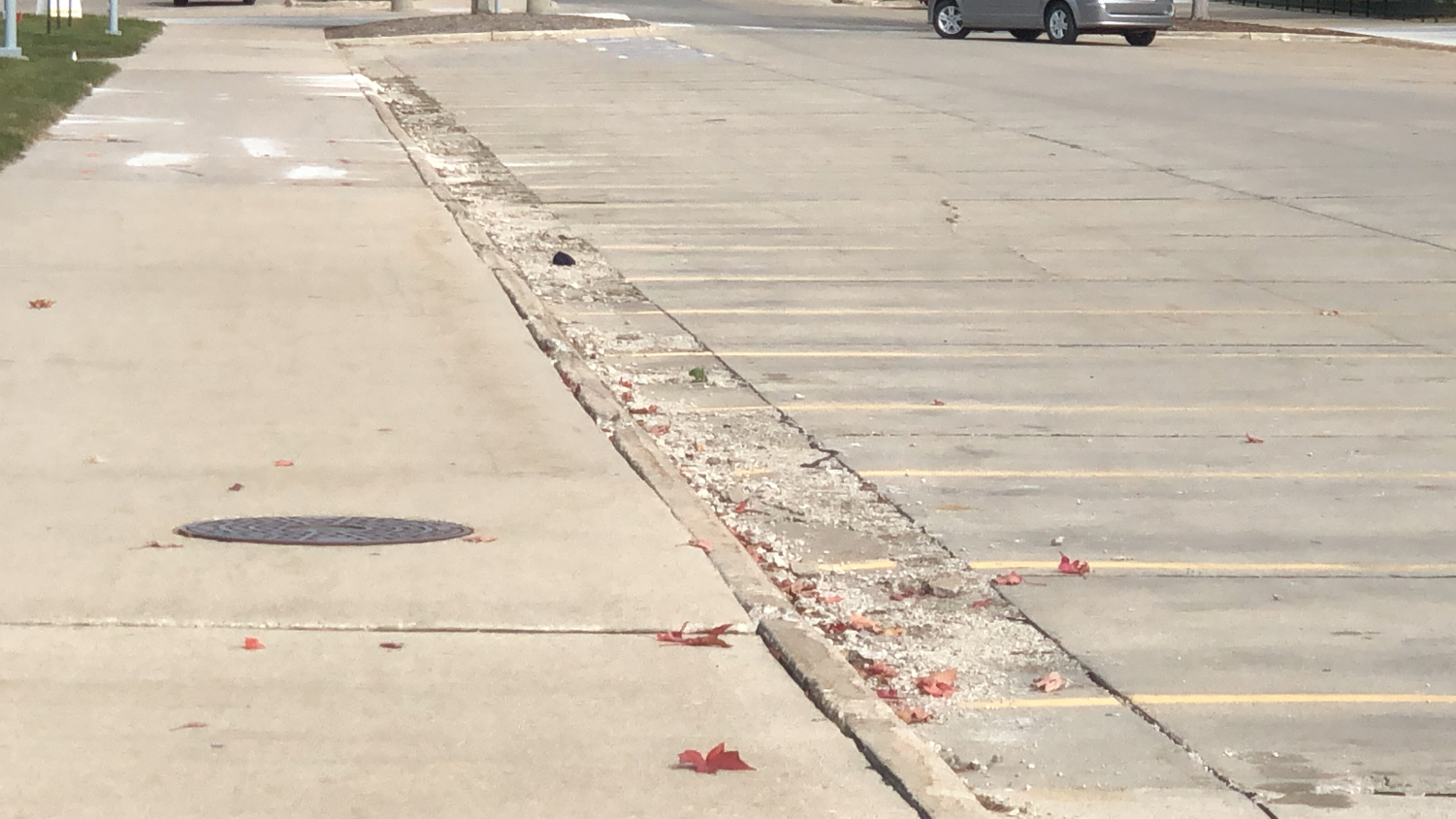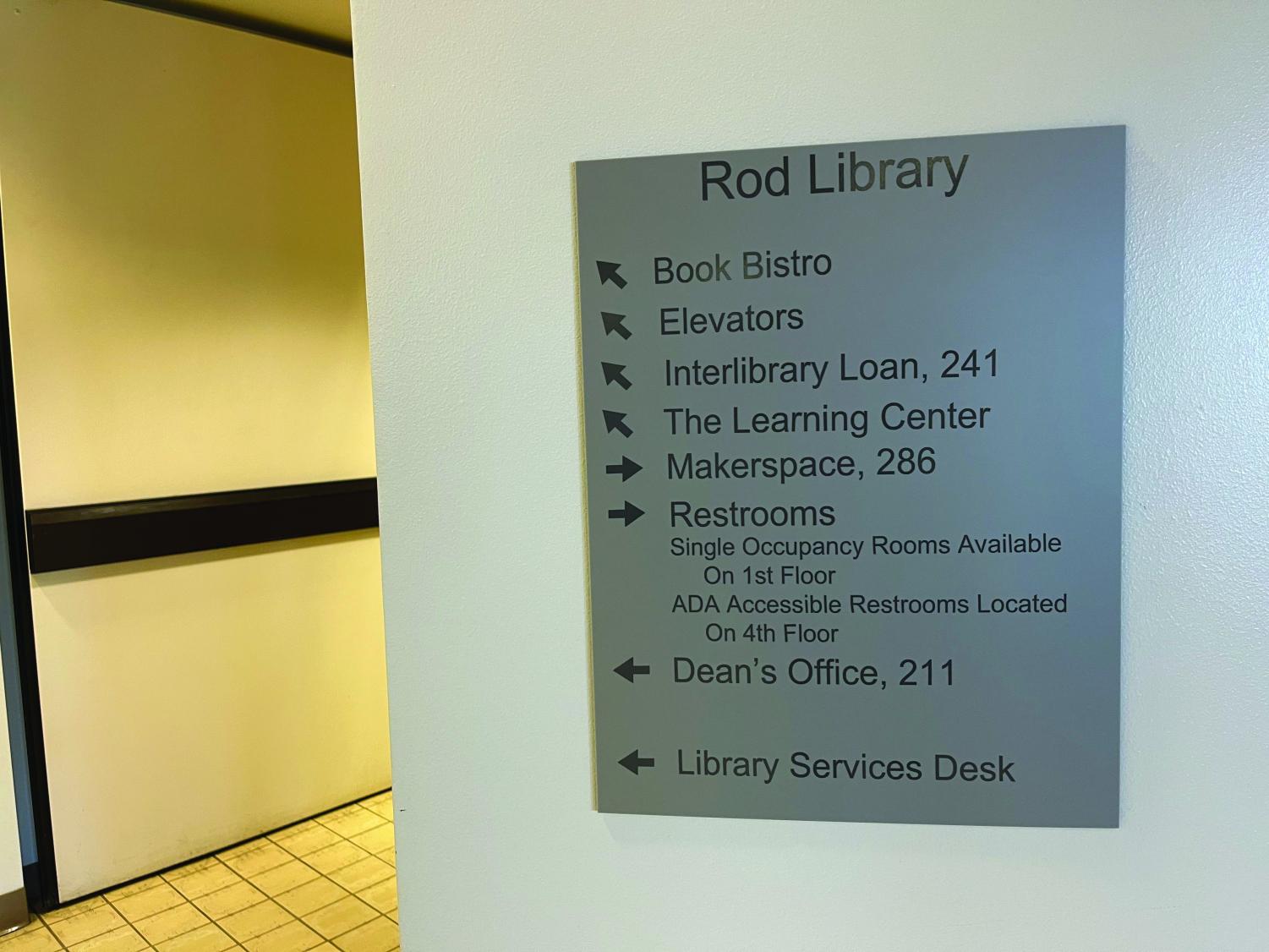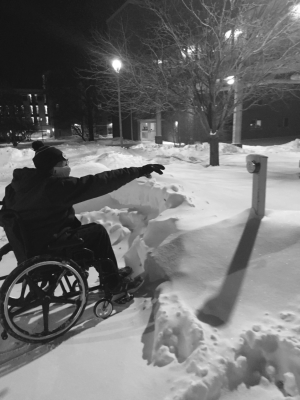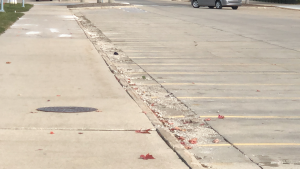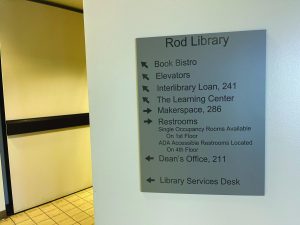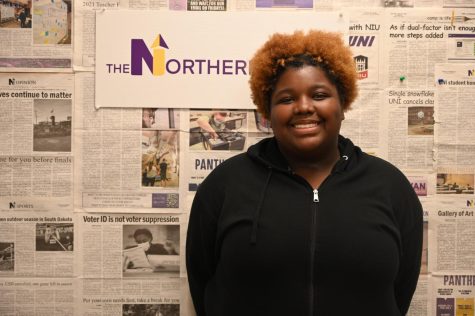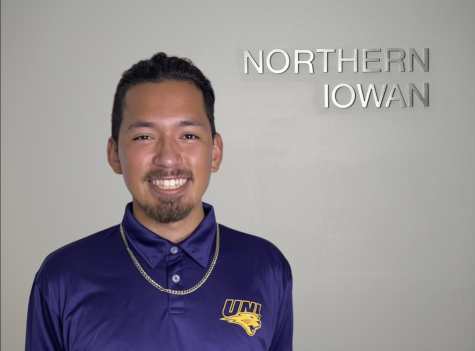Do you have access?
Oct 9, 2022
Student Caleb Gahle speaks on his journey in advocating for others to have access
The first week of classes was full of welcome events. The Center for Multicultural Education hosted a Cones and Connections event on Aug. 31. A conversation starter inspired this article.
“How’s your semester going?” Caleb Gahle answered with a smile. “Not so good. My wheelchair broke and I’m not used to walking around campus. ”
Gahle is a fifth-year social studies education major with a minor in public history. He’s a student ambassador who gives tours and advocates for accessibility services on campus. He’s the co-vice president of Diversity, Equity and Inclusion. This means regular meetings with the university’s president and various departments. Gahle is a student ambassador. He gives tours to prospective and new students around campus.
Gahle also has a physical disability caused by cerebral palsy. According to the National Institute of Neurological Disorders and Stroke, cerebral palsy refers to a number of neurological disorders and this appears in early childhood and permanently affects muscle coordination and body movement The cerebral palsy caused him to have limited mobility in his lower limbs. His wheelchair helps him make the 10-15 minute walks for able-bodied people easier to make. It would take weeks for him to get a replacement, so he had to use a walker to get by in the meantime.
Gahle is also creating a new student organization called Awareness, Community, Collaboration, Empowerment, Support and Success (ACCESS). The group for disabled students of all kinds to have a place where they are able to share and spread awareness about themselves and stigmas around disabilities, allyship and a place for people to be themselves. Disabilities come in many different forms. They are not just physical but can be mental, visual and auditory and can affect people in different ways.
Gahle states, “Frankly, the issue is awareness; it isn’t whom we talk to, but that largely when we do, no action is taken.”
Awareness is the first step to realizing that there are problems that affect those who aren’t us. Those problems can affect or present themselves differently indirectly. But it takes multiple different groups to help solve them.
The university abides by the Federal American Disability Act (ADA) of 1990 and Americans with Disabilities Act Amendments Act (ADAAA) of 2008. These acts protect people with disabilities from discrimination in companies, workplaces and public institutions. The ADAAA of 2008 requires that buildings have equal access for all, which includes handicap buttons and ramps for mobility. Equal access also means providing alternative routes and regular updates to possible physical and limited barriers like captions for the hard of hearing, a handicap button not blocked by construction, a clear snow path and auxiliary aids for the visually impaired.
Nick Johnson graduated in the spring and earned a degree in graphic design from UNI. Johnson was the Co-Director of Accessibility alongside Gahle for the Northern Iowa Student Government (NISG) in 2019. Johnson and Gahle met during a dorm room meeting their freshman year. Gahle remembers saying, “Hi, my name is Caleb. I have cerebral palsy. ” Johnson shouted, “Hey! Me too!” in reply. They became roommates after. By bonding over shared experiences, Johnson helped inspired Gahle’s interest for advocacy following the Polar vortex of 2019. These problems have persisted since before their predecessors in NISG, the change of directors for Student Accessibility Services and even now.
Gahle stated that: “One may be ‘sorry’ that these issues have occurred, but the correct apology is continued, substantial action. Being too high up in the chain of command is not an excuse for continued inaction, especially for a university that prides itself on inclusion and attending to the needs of its students.”
Johnson shared stories of many trips and falls due to chunks of concrete missing in the sidewalks. Gahle has spun out and fallen out of his wheelchair several times due to the same issue. Johnson recalled having to dig a student in a power wheelchair out of snow with his bare hands. This was because the ramp was packed with snow.
They created various email threads of mass communication to different departments regarding large-scale accessibility issues, following the guidelines by taking pictures and filing complaints. They invited themselves to annual safety walks with administrators showing the areas they’ve fallen, the chunks of concrete that are supposed to be intact or updated.
They came up with the Snow Removal Act. This act created superimposed routes for the facilities office to remove and prioritize so that students, disabled or not, are able to walk to class without slipping and falling on ice or getting their wheelchairs stuck in the snow. That was only a temporary solution since the plan was stopped after a year or so.
NISG President Leila Masinovic and Vice President Micaiah Krutsinger agree that it’s important to spread and share the issues to find solutions to continued problems. The NISG leaders were surprised to hear about the scope of their issues. Prior to our interview, Masinovic and Krutsinger were drafting an Ice Snow Removal Act. The proposal would use IT to create an app that lets students know the best routes during the winter. This goes to show that there’s not a continued dialogue from the administration with other student-led groups concerning accessibility. Especially when NISG has positions for accessibility directors within the organization.
Masinovic states: “First, we need to seek to understand and be more educated on issues that affect others, especially those we want to work with so that we can help each other.” I know I’m privileged in the sense that I don’t have to worry about accessibility issues. I can’t believe that these problems have been going on for so long. The university needs to take students seriously and give ALL students the same care. We may not be able to solve every problem, but we can at least try to do something.”
Notable departments on campus that deal with accessibility concerns are Facilities Management, University Housing and Dining, Student Accessibility Services and the Office of Compliance and Equity Management.
Tiffany Dodd is the assistant dean of students for accessibility services. She regularly works with Gahle. She advocates a lot for the students who come to her. Gahle states that her office is always in his corner.
Leah Gutknecht is the assistant to the president for the Office of Compliance and Equity Management (OCEM). She’s also the lead compliance officer, meaning she adheres to and supervises the office by following “Title IX, Title VII, ADA/Section 504, and related civil rights based regulations.” Gutknecht states that, “the OCEM ensures equal opportunity in all of the institution’s educational and employment opportunities.” That includes: “responding to concerns of protected class discrimination and harassment, managing our affirmative action and prevention efforts. “
Gutknecht said: “We [OCEM, SAS, UHD, Facilities Management] all end up working together to address any issues that cross over multiple areas.” She also expressed that it can be challenging to keep campus buildings up to date with the ADAAA since they were built before its implementation in 2008. “Right now we’re in the process of documenting some of the enhanced commitments we’ve made via changes to Policy 13.15 Accommodations for Disabilities.”
Rod library staff have concerns regarding bathroom accessibility too. Some shared that they would like to convert some 2nd-floor staff bathrooms into accessible single-use all-inclusive bathrooms.
Recent construction and renovation around campus raised concerns for accessibility updates. The need for a regular update can help disabled students and walkers on campus with alternative routes, alternative entrances, and more time to plan a trip-free trip to class. Gahle proposed an alert system similar to that of the university’s police department. He hasn’t heard any feedback since.
The university needs to be honest and transparent regarding the timeliness of addressing issues, concerns, and courses of action for students and staff. There may be more barriers than long-term solutions at the administrative level. The office is capable of creating at least a short-term fix to the more significant problem of systemic issues on campus. It’s truly up to the students and faculty to hold our administration accountable and transparent. Whatever the excuses, we deserve an explanation as to why the issues that affect our day-to-day are pushed back.
This article is a brief summary of a truly larger scope of the issues surrounding accessibility advocacy on campus and the larger systemic issues of transparency, continued solutions at an institutional level.

